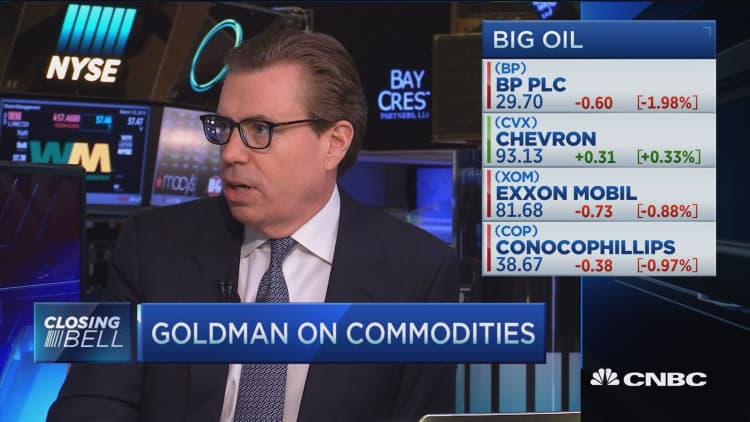
The commodities market has set itself up for a self-defeating rally, Jeff Currie, global head of commodities research at Goldman Sachs, told CNBC on Thursday, as U.S. crude closed down 1 percent.
Currie said in a "Closing Bell" interview that market views have driven a premature surge in commodity prices that is unsustainable.
"I think there were three forces at play ... reflation, realignment and relevering," he said.
Currie says that the expectation of the oil market rebalancing sparked a big rally recently, but those were mere presumptions. He added that as people adopted the idea of central bank policy realignment, the dollar became weaker and commodity prices rose.
Along those lines, Currie projects three rate hikes in the U.S. this year. Conversely, the president of the European Central Bank, Mario Draghi, announced on Thursday that the ECB had expanded its QE policy.
"The experience with negative rates, in our case at least, has been very positive in easing financial conditions and in transmission of this better financing conditions to the real economy," Draghi said.
While central bank policies worry market watchers, investors continue to eye oil as the possibility of a crude production freeze remains tepid. Currie thinks OPEC's ability to run the cartel under a low oil price environment is limited by the "fast-cycle nature of shale."
"Russia was already at peak production, Saudi Arabia was not going to invest anymore, so it was really no sweat for them to make this commitment," he noted, adding that Goldman doesn't see changes in fundamentals.
Brent crude futures were down $1.02 to $40.05 a barrel, having earlier this week reached $41.48, the highest level since Dec. 9.
U.S. crude settled at $37.84 a barrel, down 45 cents, or 1.18 percent, having hit $38.51 on Tuesday, also its highest since Dec. 9.
"Once the market begins to rebalance, we'll start to see evidence of a deficit and actually draws in inventory, then you'll get the green light to start to move higher," Currie said forecasting three to six months of volatility left.
— Reuters contributed to this report.


